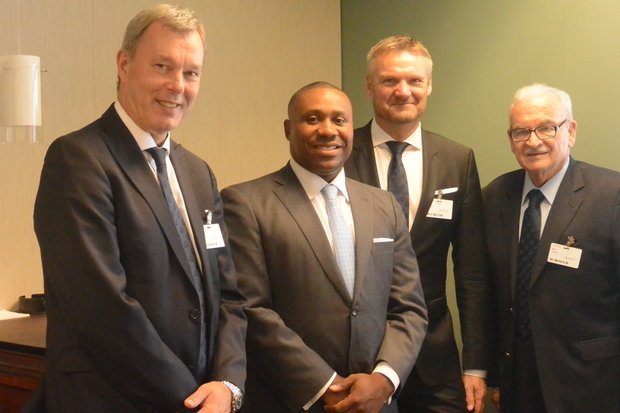Articel by Michael Tomberlin published on www.al.com
World Games CEO visits Birmingham, meets board, says there's 'a lot to do'
It sounded like a great idea at the time. Really, really great.
The World Games! In Birmingham! Four thousand athletes from around the world! Thirty-six (or so) sports! Two-hundred-and-fifty million dollars (give or take) flowing into our economy like a refreshing summer storm! We got 'em!
 Let's face it, y'all: most of us hadn't even heard of the World Games when it was announced in January 2015 that Birmingham had beaten out Lima, Peru and Ufa, Russia for the 2021 event. Nor do we still know some of the sports—korfball?!—that make up the games.
Let's face it, y'all: most of us hadn't even heard of the World Games when it was announced in January 2015 that Birmingham had beaten out Lima, Peru and Ufa, Russia for the 2021 event. Nor do we still know some of the sports—korfball?!—that make up the games.
Nonetheless, we embraced the W, just as we do here, and celebrated the selection as yet another indication that Birmingham is rising from the ashes and evolving into the next great American city we all want it to be.
Then we forgot about it. Twenty-twenty-one? Please. That's a long ways away.
More than 18 months later, well, not so much. Now?
"We've got 1,764 days..."
The phrase rolled off Jonathan Porter's lips on Monday afternoon with a dash of bemusement—and a hint of angst. In July, he became chairman of the board of the World Games 2021 Birmingham Foundation, replacing Birmingham businessman and philanthropist Edgar Weldon, who retired after serving as a key figure in securing the Games. (The foundation is producing the Games in partnership with the City of Birmingham and the International World Games Association.)
"We have to look at it that way," Porter said, acknowledging that the number includes weekends, holidays and whatever other days that make the arrival of the Games even closer than anyone might like to admit. Especially since preparation has been all-but-stagnant since Birmingham's selection was announced, erasing what was intentionally designed to be a head start for the city by the International World Games Executive Committee, which made its decision a year ahead of its typical timetable.
"We have experienced some delays, though not intentional or malicious," said Porter, vice president of the Birmingham Division for Alabama Power. "There are a number of deliverables and action items that should have been done before now, but we will get back on track.
"Do we have a lot of work to do? Absolutely, no doubt."
Porter had just concluded a marathon committee meeting, which was attended by IWGA CEO Joachim Gossow and Hagan Bossdorf, the IWGA's television and new media coordinator, both of whom spoke exclusively to AL.com.
Gossow has been in Birmingham from Germany since Saturday, a trip planned to get to know the newly configured board—including new members Scott Adams of Protective Life, and Leroy Abrahams of Regions Bank—and address concerns on both sides of the table, including the Games' monstrous $75 million budget.
"We like to know each other before we start any discussions," Gossow said. "This was necessary for both sides because we had different developments we had to discuss. We signed a new memorandum of understanding with the [Foundation] board [and the City of Birmingham], shared that we have a new partnership that will allow us for the first time next year to offer TV worldwide 24/7, and talked about how Birmingham can best make use of that. There were other issues, too, that might have worried Birmingham.
"It was quite relaxed," Gossow said of the meeting, "but we all know have a lot to do."
Perhaps the biggest issue of concern on this side of the world was that $75 million required to pay for the Games.
The City of Birmingham has committed $3.5 million to the Games ($1 million has already been paid, with $500,000 being contributed annually leading up to 2021). The Foundation is seeking financial support from Jefferson County, the state of Alabama and other public entities, such as the Alabama Tourism Department and the Greater Birmingham Convention and Visitors Bureau.
Revenues will also be generated by ticket sales and television rights fees.
But the lion's share—perhaps $30 million or more—is to come from the private sector in the form of sponsorships. That's a staggering commitment, which grew more and more daunting as the euphoria from winning the bid wore off.
The Games will be the first to be so dependent upon private funding; all prior Games were supported with public funds, something that would not happen in the United States.
"We have experienced some delays, though not intentional or malicious."
On Monday, the parties did not reach an agreement on a new budget figure, but both sides agreed it would be lower than $75 million, perhaps significantly lower.
"We may have some opportunities to re-finance the budget," Porter said "Not that anything was in error, just streamlining some things. We want to make sure the budget is reasonable and manageable."
For instance, athletes will stay in university housing in Birmingham, rather than hotels, another World Games first.
"We've never ever exceeded a budget, and we're confident we won't in 2021," Gossow said. "We will try to support our partner to bring it down as much as possible without putting the Games at risk. It will be a fair deal."
The IWGA is slated to receive $300,000 annually for four years, starting in 2018, according to sources.
The Games, which are overseen by the International Olympic Committee, is essentially an incubator for sports trying to crack the Olympics. Another Birmingham's concern was that a number of sports would not be performed in Birmingham because they would be admitted in the 2020 Tokyo Olympics, diminishing the size of the delegations slated to come to the city.
Gossow assured the board that no sports would be dropped.
Bossdorf jokingly said the primary reason for their trip was "whether it is too hot in Birmingham," which prompted chuckles around the room.
He then added the meeting was most critical for ensuring all parties were in agreement and prepared to make up for lost time before World Games 2017, which launch in Wroclaw, Poland on July 20 of next year.
"We still have a lot of time to prepare, but the timeline has to be right," he said "We want to use the World Games next summer to promote Birmingham and prepare. That's normal. It's such a complex project."
Also attending the meeting was Ron Froehlich, the former IWGA president (1992-2014) and native of Johannesburg, South Africa who moved to Birmingham in 1976. He is currently Honorary Life President of the IWGA. Last year, he was inducted into the Alabama Sports Hall of Fame, and was the quiet force behind bringing the Games to Birmingham.
One person I know described him as "The Wizard [of Oz] behind the curtain."
"These are the Games for real, true athletes, not pros," he said. "Not guys like Usain Bolt with millions in endorsements after winning a gold medal."
Like others, he was concerned about the time lost since Birmingham was awarded the Games. But he called Monday's meeting "very informative."
"We had to put everything on the table," he added. "We have to catch up.
"This may be my final act in terms of the World Games. In 2021, I will be 83. God willing, I'll be here. Maybe then they'll ask me to hang up my gloves."
As Froehlich spoke, Gossow smiled and rested his forehead in his hands, a hint that "Wizard" isn't going anywhere.
Porter says the board could add up to three new board members before the end of the year.
And when asked if the board had made any operation decisions regarding who (or what entity) will oversee the logistics of putting on the Games, he said: "We;re not at that point yet."
"It was not a fluffy meeting," Porter said. "It was a good opportunity to hear from them directly, to ensure that our respective goals and objectives were as closely aligned as possible. We wanted to put the pillars in place so that in January we can begin to work at light speed."
Because the calendar isn't waiting.
Articel by Michael Tomberlin published on www.al.com

